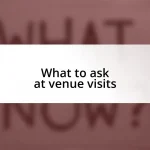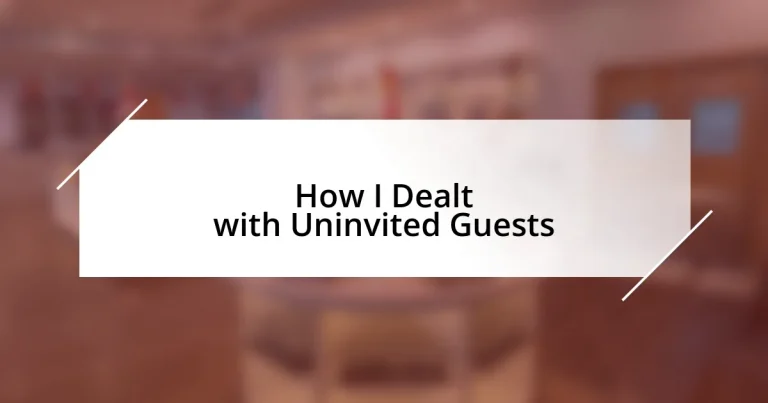Key takeaways:
- Uninvited guests can evoke a mix of emotions; understanding their intentions helps frame our reactions.
- It’s crucial to assess the situation calmly by observing body language, acknowledging feelings, and considering context before responding.
- Setting boundaries politely is essential; communicating preferences upfront can prevent discomfort and promote respect.
- Honesty and vulnerability in communication can strengthen relationships, turning potentially awkward moments into opportunities for connection.
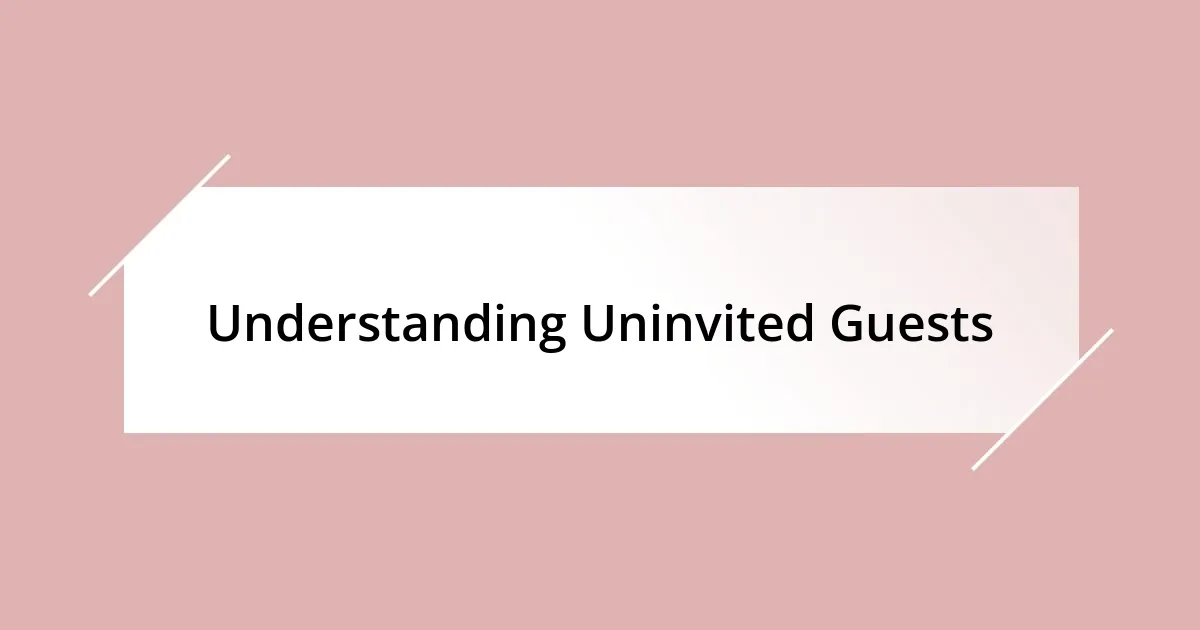
Understanding Uninvited Guests
Uninvited guests can stir a mix of feelings, from surprise to irritation. I remember one holiday season when a neighbor I barely knew showed up at my door with an armful of goodies. While I appreciated the gesture, the unexpected visit left me scrambling to make small talk, wondering if I should have prepared something more elaborate.
Understanding the underlying reasons why someone might drop by unannounced can help us frame our reaction. Sometimes, it’s a testament to their spontaneity or a desire for connection. I once had a friend who would often pop in uninvited, believing that it strengthened our bond. But it also made me reflect on my own boundaries and how important it is to communicate them gently, yet effectively.
It’s fascinating how different cultures perceive unplanned visits. In some places, it’s a sign of warmth and community, while in others, it’s seen as intrusive. I’ve faced this duality myself; during my travels, I encountered families who welcomed drop-ins with open arms, turning what could be an awkward moment into a joyful gathering. How do you navigate these cultural differences when it comes to guest etiquette in your own life?
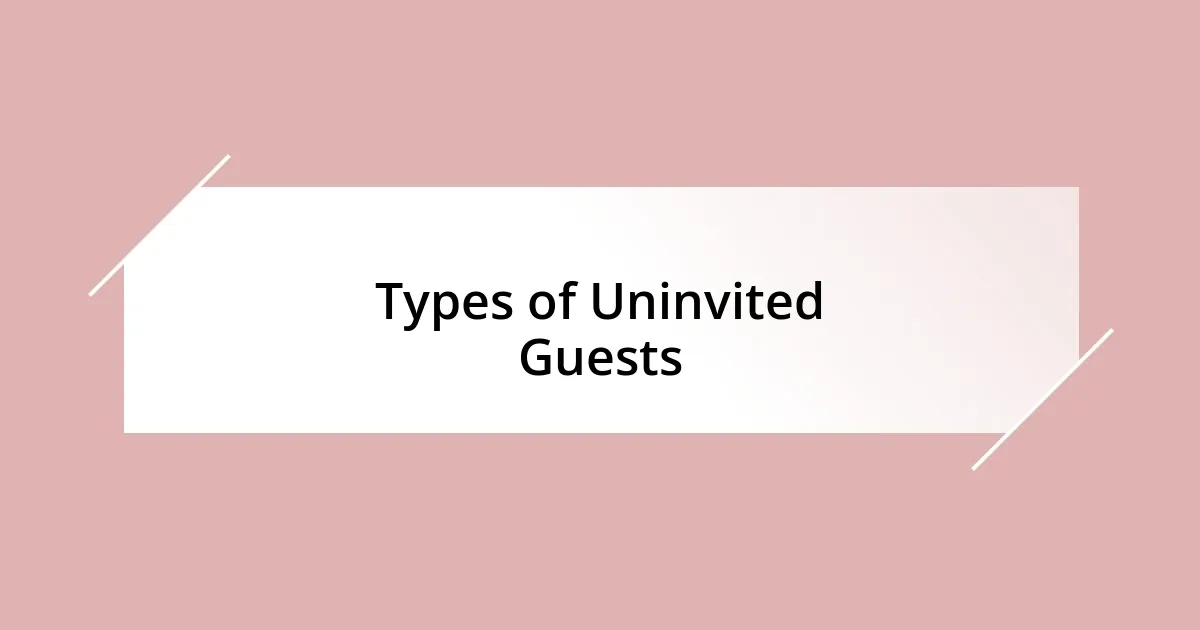
Types of Uninvited Guests
When considering uninvited guests, it’s essential to recognize the different types that can appear at your door. One category is the casual acquaintance, someone who may feel comfortable popping by without a formal invitation. I once had a colleague who would often stop by after work, asking if I wanted to join for dinner. While I appreciated their friendliness, it sometimes disrupted my evening routine. It made me realize how important it is to establish expectations around visits.
Another type is the family member, someone who might believe they have the right to drop in whenever they please. I remember my cousin showing up unannounced during a busy weekend, thinking it would be a fun surprise. While I loved seeing them, I felt overwhelmed trying to juggle my plans with their visit. It also highlighted the delicate balance between family ties and personal space—something that often requires open dialogue.
Lastly, we have the stranger or unexpected visitor, which can be the trickiest of all. A few years ago, a delivery person mistakenly came to my house thinking it was their next stop. Initially, I felt uneasy; however, I ended up sharing a laugh over the mix-up. This incident underscored how uninvited guests can come in many forms, from the well-meaning to the bewildering, and each encounter invites us to navigate our comfort zones and boundaries.
| Type of Uninvited Guest | Characteristics |
|---|---|
| Casual Acquaintance | Feels comfortable stopping by, may disrupt plans |
| Family Member | Feels entitled to visit anytime, needing balance between connection and space |
| Stranger | Unexpected visits that can be surprising or awkward, fostering unexpected interactions |
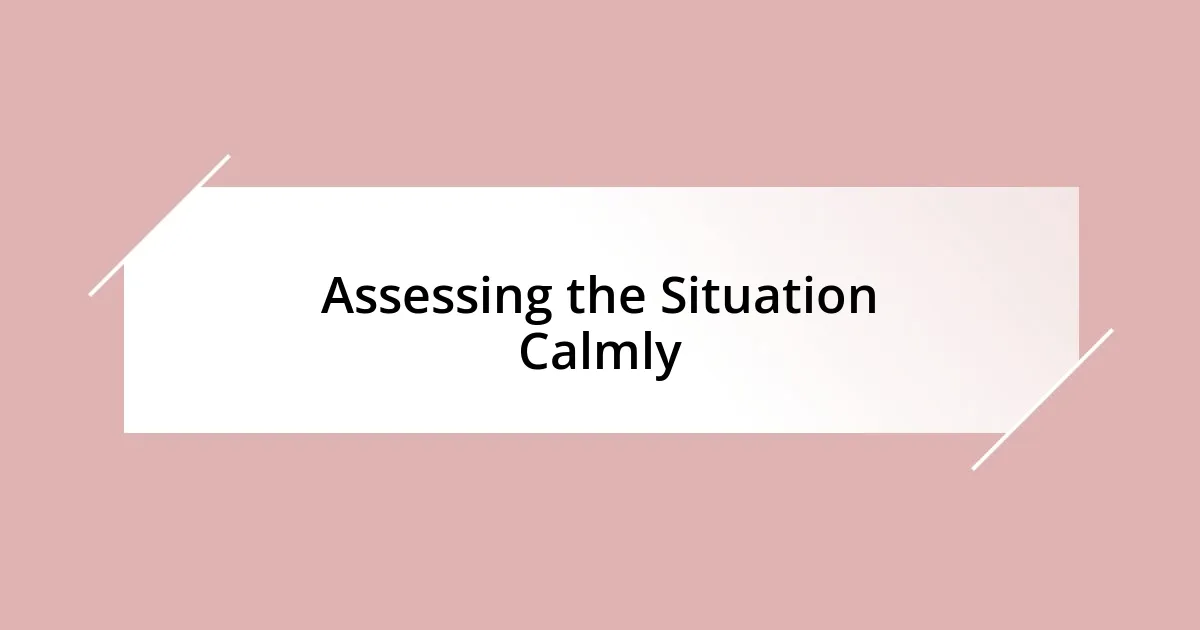
Assessing the Situation Calmly
In those initial moments after discovering uninvited guests on my doorstep, I’ve learned the importance of pausing to assess the situation instead of reacting impulsively. Once, during a particularly hectic evening, I opened the door to find a couple of friends. Rather than expressing my surprise with frustration, I took a deep breath and assessed how their visit fit into my plans. Understanding my emotions in that moment helped me respond more thoughtfully rather than simply asking them to leave.
Here are some key points to keep in mind when assessing the situation calmly:
- Observe Body Language: Notice their demeanor; are they excited or anxious? This could guide your reaction.
- Gauge Your Own Feelings: Acknowledge your emotions, whether it’s joy, frustration, or confusion. Recognizing what you feel helps manage the situation better.
- Consider the Context: Have you had a recent celebration or event? Context can highlight whether the visit feels appropriate or intrusive.
- Take a Moment: Allow yourself a few seconds to breathe before responding. This can prevent knee-jerk reactions.
- Determine Your Priorities: Think about what you value more at that moment—connection with friends or maintaining your routine.
By carefully evaluating these aspects, I’ve found it’s easier to create a comfortable and inviting atmosphere, even when the guest list wasn’t what I had in mind.
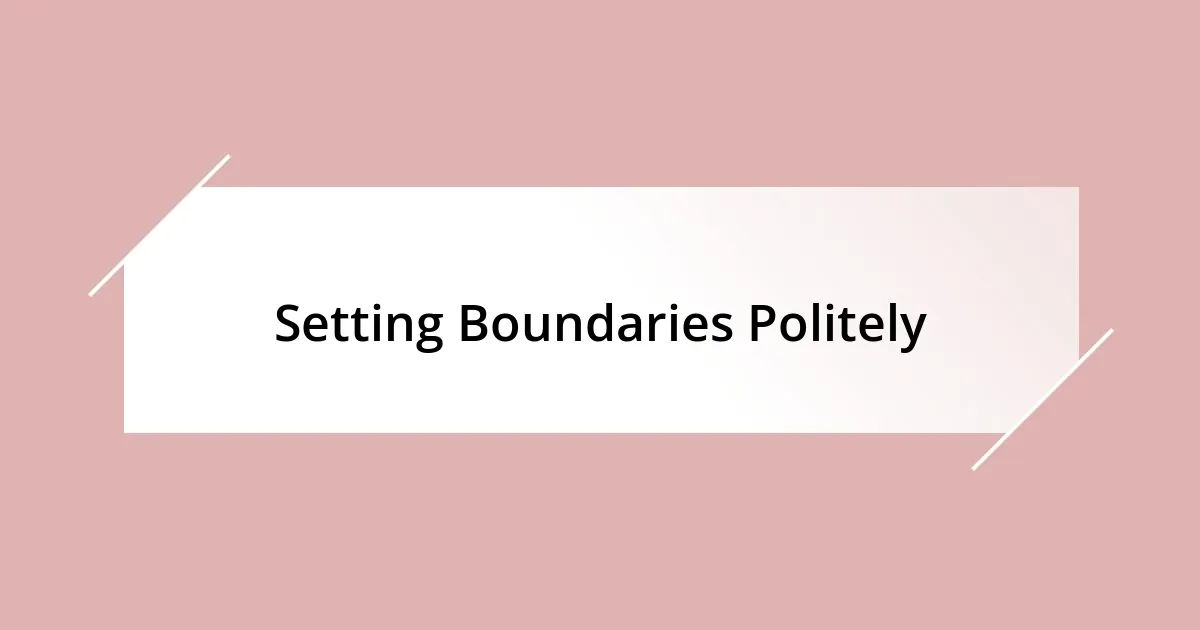
Setting Boundaries Politely
Setting boundaries with uninvited guests can be tricky, but I believe it’s all about delivering the message with kindness and clarity. The last time a close friend dropped in without checking first, I felt both surprise and a hint of annoyance. I chose to gently explain that while I love having them over, I also value those moments of having my space. This candid but polite approach not only respected my feelings but also strengthened our friendship.
Creating a welcoming environment is important, but I’ve realized that my comfort must come first. I recall a time when a casual acquaintance arrived unexpectedly, eager to chat and catch up. Instead of shutting the door on them, I smiled and said, “I’d love to catch up, but could we set a time instead? I have some things I need to finish first.” It was a small statement, yet it allowed me to maintain my boundaries without hurting anyone’s feelings. Have you ever considered how one simple phrase can shift the dynamics of a visit?
Sometimes, it helps to establish a routine that communicates boundaries before any surprises occur. I’ve found that casually mentioning my schedule during conversations creates a natural understanding. The other day, while chatting with a neighbor about weekend plans, I casually mentioned I prefer quiet weekends. This simple dialogue not only planted the seed for future visits but also made it clear that unexpected drop-ins might not be the best idea. This proactive approach can set a tone of respect and understanding right from the start.
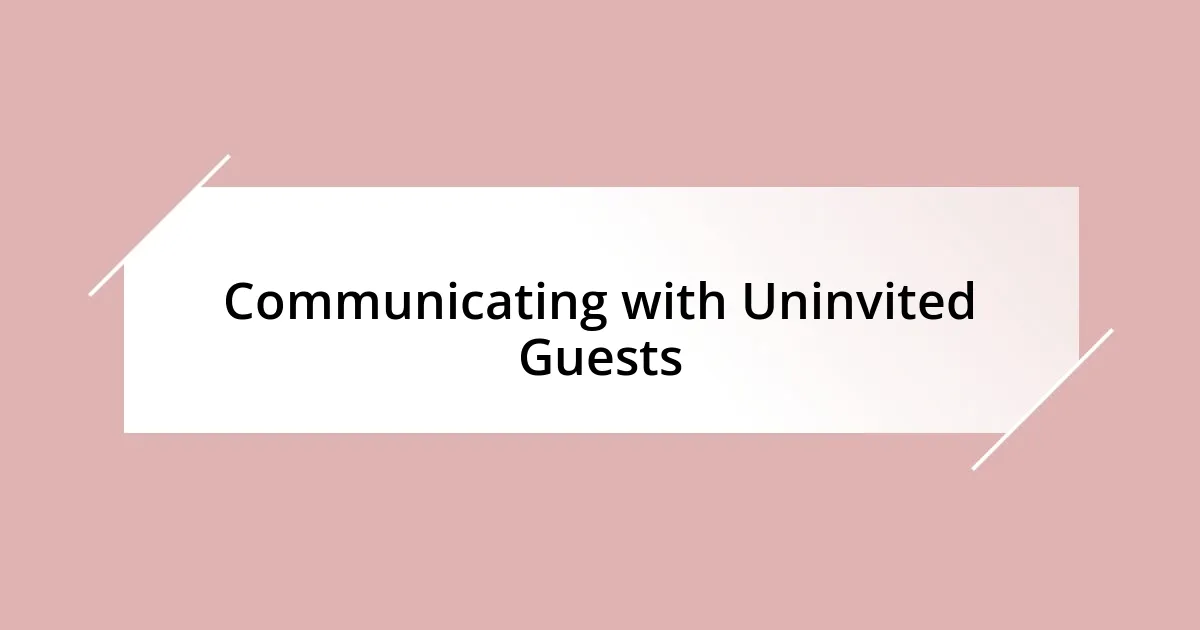
Communicating with Uninvited Guests
When I find myself facing uninvited guests, I always aim to communicate with honesty and warmth. I remember one instance when a neighbor stopped by unannounced while I was deep into a project. Instead of expressing frustration, I smiled and said, “I’m really focused on something right now, but let’s catch up later!” This not only conveyed my situation but also left the door open for future interaction, preserving our friendly rapport. Isn’t it interesting how a little transparency can keep relationships strong while still prioritizing your needs?
One effective strategy I’ve employed is to ask open-ended questions during initial conversations to gauge where things are headed. Recently, a friend dropped by just as I was preparing dinner. I asked, “What’s on your mind today?” This not only shifted the focus to her but also subtly indicated that my evening plans were in full swing. Have you found that little questions can help redirect the conversation while remaining polite? That moment of inquiry helped me maintain a connection without compromising my evening.
And let’s not overlook the power of non-verbal communication. I can recall a time I had a friend show up unexpectedly while I was working from home. As I engaged in conversation, I made sure my body language remained open yet focused on my laptop. Sometimes, just the simple act of glancing more towards my screen while nodding along can signal that I’m busy but still interested. Isn’t it remarkable how our actions often speak louder than words? By being mindful of both spoken and unspoken cues, I’ve found a balance where my guests feel acknowledged while I maintain my space.
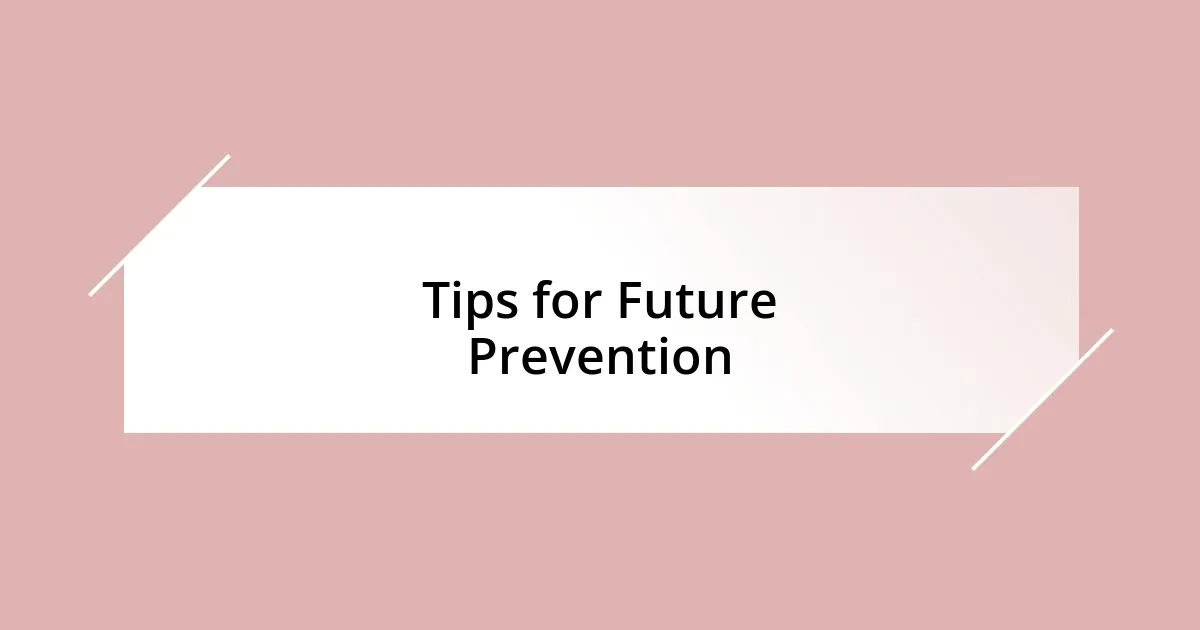
Tips for Future Prevention
Establishing clear communication from the outset is key to preventing those surprise visits. I learned this the hard way when a family friend would often stop by uninvited. One day, I decided to mention at lunch, “I love when you come over, but it can be hectic if I don’t have a heads-up.” I felt a weight lift off my shoulders after expressing that need, and thankfully, she understood. Don’t you think a little upfront honesty can save both parties from future discomfort?
Another tip I’ve found invaluable is creating a “visiting schedule” with close friends and family. Last year, I started sending out a quick text every month proposing a get-together time. By making it a habit to plan ahead, I noticed a remarkable decrease in unexpected knockings at the door. Isn’t it fascinating how a small shift in approach can lead to respecting everyone’s time and space?
Lastly, consider utilizing social media or group texts to communicate general availability. I often update my status to reflect busy weekends or travel plans. One time, I posted about a workshop I was attending, and it magically created a ripple effect—friends who might have planned spontaneous visits saw I was tied up and adjusted accordingly. The beauty of modern communication can truly help shape expectations and avoid unintended surprises, don’t you think?
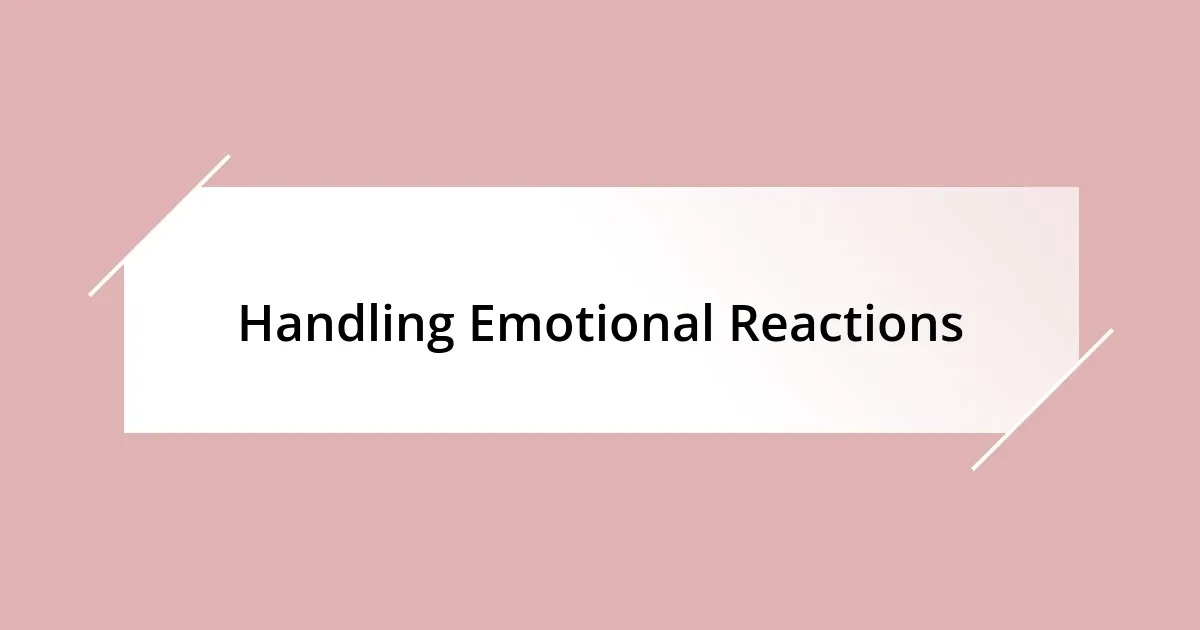
Handling Emotional Reactions
Handling emotional reactions can be tricky when uninvited guests catch us off-guard. I remember a time when I opened the door to find my cousin, and immediately, a wave of anxiety washed over me. My mind raced, thinking of everything I had left undone. I took a deep breath and reminded myself that it’s okay to feel overwhelmed. Recognizing those emotions helped me to respond more thoughtfully rather than react impulsively.
In another instance, a friend popped by during a family crisis. I felt my heart tighten as I struggled to keep my composure. Instead of pretending everything was fine, I chose to be honest and said, “This isn’t a great time for me; I’m feeling a bit out of sorts.” It was liberating to share my truth. This openness not only relieved some of my emotional burden but also strengthened our friendship, as she responded with understanding and support. Have you ever found that vulnerability transforms a tense situation into an opportunity for connection?
Sometimes, I notice that my initial emotional reactions can lead to overthinking afterward. After a particularly chaotic visit, where I felt like I wasn’t my best self, I spent the night reflecting on how the interaction unfolded. I realized being genuine about my feelings helped my guests see me as more relatable, rather than just the host they expected. Rather than dwelling on what went wrong, I reminded myself that it’s natural to be caught off-guard. And isn’t it reassuring to know that we all have those moments? Embracing vulnerability allows us to navigate these situations with more grace, for ourselves and our guests.







